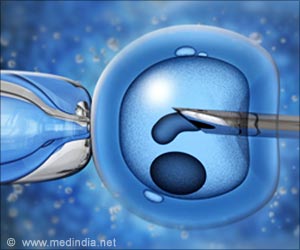Findings from a new study showed egg donation patients had a more than three-fold higher risk of pregnancy-induced hypertension than the routine IVF patients.

With an ever-ageing female patient population, egg donation is an increasingly common treatment in infertility. ESHRE's own annual reports on fertility treatments in Europe show a rise in egg donation cycles from 15,028 in 2007 to 24,517 in 2010 (to 4.05% of all treatments). This proportion is still some way behind the USA, where egg donation now accounts for around 12% of all treatments.
As women age their store of viable eggs reduces such that their "ovarian reserve" (and likelihood of pregnancy) declines. Once the eggs have gone, they cannot be replaced, and egg donation is the only possible treatment. In addition, studies consistently show that eggs produced by women in older age groups form embryos with a higher prevalence of chromosome defects than those from younger women: these embryos are less likely to implant and more likely to result in miscarriage if they do implant. As a result, fertility treatment with donor eggs is much more common among older women than among younger.
Studies also show that egg donation is an increasingly successful treatment, with live birth rates of around 55% per transfer recorded in the latest US data; success largely depends on the age of the donor, not on the age of the recipient.
Egg donation, like IVF and ICSI, is considered a safe treatment, despite the older age of patients, but a new study from France has found that the pregnancies of egg donation patients are at a higher risk of disorders - particularly relating to high blood pressure - than the pregnancies of routine IVF patients using their own eggs.
Details of this study are presented today by Dr Hélène Letur from the Institut Mutualiste Montsouris in Paris at the 30th Annual Meeting of ESHRE held in Munich.
Advertisement
This was a case-control study from seven IVF centres in France in which each singleton egg donation pregnancy recorded at 7-8 weeks between 2005 and 2011 was matched with two control routine IVF pregnancies; 580 pregnancies were included in the study (217 egg donation, 363 controls).
Advertisement
"This study confirms several other reports in the literature," said Dr Letur, "with a large sample and matched control group. We would have to conclude from the results that egg donation itself is a risk factor for pregnancy-induced hypertension and pre-eclampsia."
Dr Letur added that the high prevalence of pregnancy induced hypertension in the egg donation group (almost 18% were affected) means that patients and obstetricians must be aware of the risk. "Preventive measures and care are necessary," she said. These include screening for risk factors for hypertension (such as obesity and diabetes) and early treatment if gestational hypertension is detected. "For the future," she added, "might we match donors and recipients based on genetic factors, or consider fertility preservation for women with a high risk of premature ovarian failure?"
Possible biological explanations for the findings include changes in the immune tolerance of the embryo, whose full genome is not concordant with the recipient's. Blood pressure may rise, says Dr Letur, "to imrpove materno-fetal exchanges".
Source-Eurekalert















